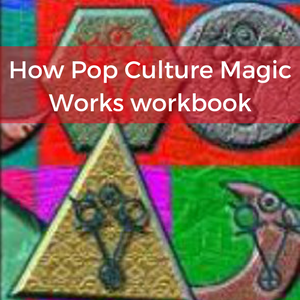Can pop culture spirits die?
One of the questions I ask is whether or not pop culture spirits can die, especially when they die within a story and it becomes part of the canon of the story. Are the pop culture spirits because the character is dead in the story and can you still work with them? In this video I share my thoughts on these questions.
Ragnarok and the nature of avatars
I recently binge watched seasons 1 and 2 of Ragnarok. It’s a modern retelling of the Norse myths, but what I found most interesting about the show is how they explored the giants and gods in the modern story. The giants are running the town and eternally cycling from young to old, while the gods end up end up manifesting as avatars that are woken up in order to fight the giants, but what’s interesting is that what is implied is that any person could become a god if they were activated.
It’s a pop culture rendition of the Norse myths and as always I find the pop culture retellings to be fascinating, because in a way a pop culture retelling is also an avatar of a mythology that has been activated to help perpetuate that mythology. Whether the pop culture is a TV show, video game, book, or comic, or some other form of media, when it calls attention to the original mythology, while also doing a retelling of the mythology in a different context, it perpetuates the mythology. This is part of the power of pop culture. It takes old stories and makes them new again.
Can you still practice pop culture magic if the pop culture has been cancelled?
The other day in the Pop Culture Magick Facebook group I asked the question: “Can you still practice pop culture magic if the pop culture has been cancelled?” I used the recent example of J. K . Rowlings and her comments on the Trans community as an example where someone might practice pop culture magic, but have an issue with what the creator of that pop culture said or did. could that person still work with the pop culture itself.
If you click the link above, you’ll get to see the responses to my question from the community. There were answers all across the spectrum on this issue and I feel like all of them were well considered. But here, I thought I would share my own answers to this question.
Two examples of pop culture spirits I'm working with
I’m currently engaged in three pop culture magic workings. I’m going to share two of those workings now, because it’s a good example of how working with two different pop cultures can be effective, under the right circumstances. The two workings are focused on the same goal. Each working is an evocation of a pop culture spirit that’s been chosen for strategic purposes. The pop culture spirits I’m working with are Grand Admiral Thrawn from Star Wars and Sam Bridges Porter from Death Stranding.
I’m working with Grand Admiral Thrawn because of his strategic genius and his ability to apply unconventional thinking toward solving situations. Thrawn has an appreciation of art, and uses the study of art to understand other cultures and the way those cultures behave. Thrawn also puts his community first. He doesn’t act from selfish ambition, but rather from a focus on trying to figure out how best to serve his community and put the community welfare first.
How pop culture spirits evolve
I’m always fascinated by how pop culture spirits change with the times. Older spirits are more set by the context of the cultures they originated from, so although they may change somewhat through the lens of modern culture, pop culture spirits are more flexible and fluid in some ways. Yet they too can become fixed and set to some degree by the expectations of the fans that enjoy the pop culture they originate from. And yet sometimes a spirit can break out of the mold in unexpected ways.
Recently I went to see the new Joker movie. I saw it once and I went back and saw it again in the theater (something I normally don’t do). Why did I go back? Because the Joker movie isn’t really a movie. It’s an experience of a person becoming the Joker. The second time I saw the movie, I watched how Joaquin Phoenix used his face and eyes to convey the gradual evolution of Arthur into Joker, but what I also saw was a dynamic rewriting of the pop culture spirit of Joker, in a direction that no one else had taken him.
